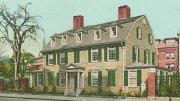1907
President Theodore Roosevelt, A.B. 1880, in town to see his son, Theodore Jr. ’09, inducted into the Porcellian Club, addresses 2,000 students and alumni at the Harvard Union. “Harvard must do more than produce students,” he tells them. “The college man, the man of intellect and training, should take the lead in every fight for civic and social righteousness.”
1922
Acknowledging the geographical dispersion of Harvard men, the Board of Overseers and the Corporation agree that henceforth Overseers and Alumni Association directors will be elected by postal ballot rather than by vote of those alumni present on Commencement day.
1937
Dean of the Divinity School Willard L. Sperry reports that attendance at Memorial Church’s morning prayers has dropped drastically with the recent move of undergraduates to the Houses. The Bulletin’s editors note, “It was just 50 years ago that Harvard abandoned the rule requiring attendance at morning prayers. Probably very few of those who objected to the change would go back to the old order even if they could.”
1947
Harvard scientists complete work on “Mark II,” the world’s largest and most advanced computer, which fills a room 50 feet by 60 feet and can solve in under a second a multiplication problem involving numbers in the billions. Cost: about $500,000.
1952
The Faculty of Arts and Sciences approves a plan to provide group tutorials for sophomores and juniors in economics, English, government, history, and social relations—another step in the administration’s effort to center more of the responsibility for the education of undergraduates in the residential Houses.
1972
WHRB observes exam period with orgies of Chopin, Creedence Clearwater, and music of “death, suffering, and the apocalypse.” (Editor’s note: The most recent orgy playlist included “The Trouble in Mind Orgy,” “The Classical Music Riot Orgy,” “Crime and Punishment,” and many works by Franz Liszt, among them “Csardás macabre” and “Malédiction, for Piano and Strings.”)








